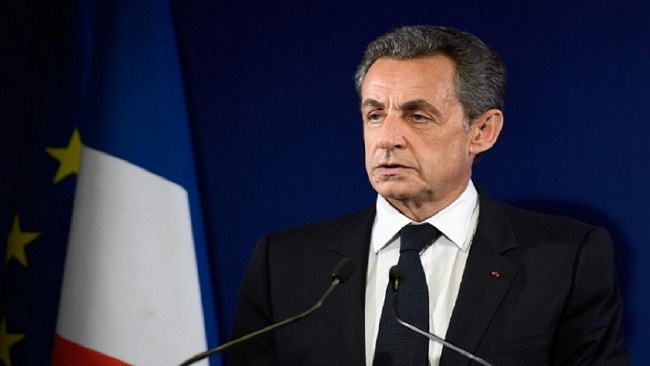Corrupt France: After guilty verdict, Sarkozy faces further trials and tribulations
Nicolas Sarkozy’s prison sentence for corruption and influence-peddling marks a legal landmark for postwar France. But things could get worse for the former French president, who faces further court battles and inquiries.
Sarkozy was sentenced on Monday to three years in jail, two of them suspended, making him the first former French president to be handed a custodial sentence.
The nature of the conviction underscores the many legal woes that have dogged the former conservative president ever since he left office in 2012.
The 66-year-old was found guilty of attempting to bribe a judge by offering him a plum job in return for insider information about a separate case.
Sarkozy will remain free while he appeals. If he loses the appeal, he is likely to serve a year at home with an electronic tag rather than go to jail.
Nonetheless, the guilty verdict is a blow to the retired politician, who still plays an influential role in French conservative politics. It is not the end of his legal troubles either.
Sarkozy, who has accused the judiciary of hounding him, faces another trial later this month and is also under investigation in a third case.
Below is a summary of his past and current legal woes.
‘Bygmalion affair’
Sarkozy will face the Paris court again later this month over claims of illegal funding for his 2012 presidential campaign, which ended in victory for his Socialist rival, François Hollande.
The “Bygmalion affair” centres on accusations that his conservative party, then known as the UMP, worked with a public relations company to hide the true cost of his re-election bid.
France sets strict limits on campaign spending.
Prosecutors allege that the company, Bygmalion, invoiced Sarkozy’s party rather than his campaign in order to get around the restrictions.
They say the scheme allowed Sarkozy and his party to spend 42.8 million euros ($50.7 million) on the campaign – almost twice the maximum authorised.
The former president has denied wrongdoing.
Libyan campaign cash
Sarkozy’s previous presidential campaign, his successful 2007 run, is also the focus of ongoing investigations – this time involving allegations of illicit Libyan funding..
The former president is under formal investigation for corruption, illegal financing and conspiracy in a case involving Libyan spies, arms dealers and allegations that late Libyan strongman Muammar Gaddafi sent Sarkozy’s election campaign suitcases stuffed with millions of euros in cash.
Gaddafi’s son Saif al-Islam was the first to air the claims in 2011, claiming Sarkozy – then the French president – should “give back the money he took from Libya to finance his electoral campaign”.
A year later, the investigative website Mediapart published a document alleging that the Libyan dictator had agreed to support Sarkozy with up to 50 million euros ($60 million at current rates).
Sarkozy has always denied the accusations, stating in a 2018 interview: “There’s not even the smallest inkling of proof.”
One of his main accusers, Franco-Lebanese businessman Ziad Takieddine, who has described himself as a “middleman in the shadows”, withdrew his account last year.
Russia consultancy
Financial prosecutors in January said they were opening a preliminary investigation into alleged influence-peddling related to activities undertaken by Sarkozy in Russia seven years after he left office.
The Mediapart website said the probe targeted a payment by Russian insurance firm Reso-Garantia of three million euros in 2019, while Sarkozy was working as an adviser.
It said investigators were trying to verify whether the former president acted only as a consultant – which would be perfectly legal – “or if he engaged in potentially criminal lobbying activities on behalf of the Russian oligarchs”.
L’Oreal heiress scandal
Sarkozy has previously been cleared in another case involving funding for his 2007 presidential run, known as the “Bettencourt affair”.
The longstanding legal tussle centred on allegations his party accepted illicit payments from L’Oréal heiress Liliane Bettencourt in cash-filled envelopes.
Bettencourt’s butler testified that Sarkozy was a regular visitor to her home during the 2007 campaign, a claim the politician denied.
After a lengthy investigation that he claimed was politically motivated, Sarkozy was cleared in 2013 of taking advantage of Bettencourt while she was too frail to understand what she was doing.
Two years later, a court in Bordeaux also cleared his close ally Éric Woerth – a former budget minister and UMP party treasurer – of wrongdoing, citing a lack of evidence despite “strong suspicions” that payments were made.
However, it was Sarkozy’s attempts to get information about the Bettencourt inquiry that eventually led to his conviction for corruption and influence-peddling on Monday.
‘Karachi affair’
Sarkozy has also been interviewed as a witness – though not as a suspect – in another long-running investigation involving campaign funding, this time for former prime minister Édouard Balladur’s unsuccessful presidential run in 1995.
The “Karachi affair” involves two former Sarkozy aides, who have been charged by judges investigating alleged kickbacks from a Pakistani arms deal concluded when Sarkozy was budget minister.
A shell company was allegedly used to channel kickbacks to Balladur’s presidential campaign, which Sarkozy helped run.
Balladur, 91, went on trial in February, charged with complicity in the alleged misappropriation of public funds. Prosecutors have asked for a one-year suspended prison term and a fine of 50,000 euros.
(FRANCE 24 with AFP, REUTERS)





